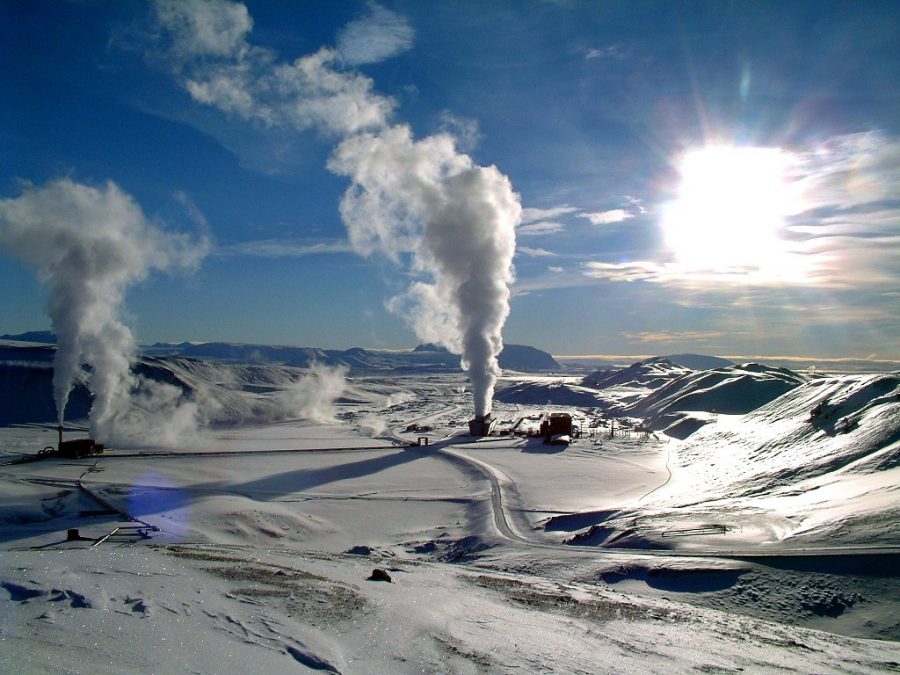Federal government must direct attention to the environment… now
Krafla geothermal power station
February 7, 2019
According to the United States Environmental Protection Agency (EPA), the U.S. is the leading producer of greenhouse gases (GHG) having emitted more carbon than the entire European Union as of 2011. Based on this statistic, the United States could become a leading combatant of climate change worldwide were it to establish a nationwide renewable energy initiative. However, rather than focus on breaking American reliance on carbon-emitting products, the government has instead devoted its time, energy and spending elsewhere.One explanation for the United States’ lack of environmental initiative is the Republican Party’s failure to acknowledge the role of humans in climate change. Even with the rapid increase in evidence supporting human-caused climate change in various scientific studies (specifically in the National Climate Assessment released four weeks ago), President Donald Trump’s response has been to blame other nations–specifically China and Japan–for global climate change. “I don’t believe it,” he said, “if we’re clean but every other place on earth is dirty, that’s not so good.”
Such ignorance also led Trump to withdraw from the Paris Climate Agreement, PCA, an international coalition dedicated to the collaborative prevention of climate change, in May. Not only did this decision make the U.S. among the first ever to withdraw from this alliance, but it will also cause the organization to lose substantial funding that could have helped to prevent climate change on a global level.
In addition to Trump’s failure to acknowledge American contributions to global warming, the administration also seems to be ignorant to or unaware of the renewable resources available in the United States. Geothermal energy is generated when turbines conduct electricity from steam produced by underground reservoirs. Because these pockets only exist in various regions, the success of geothermal power plants is largely dependent on geography. Luckily, the United States–particularly the Southwest region–has an extremely high concentration of potential geothermal energy. However, much of it remains unused underground, despite the fact that a conversion from non-renewable to geothermal energy in these areas of the U.S. would drastically decrease the nation’s contributions to global warming. But, according to the Trump administration, the federal government has more pressing, more expensive projects to fund, such as the Texas border wall.
As of April, construction of the $10 billion wall has been underway. Rather than viewing this construction as a symbol of Trump’s commitment to his campaign promises, I recognize this as an opportunity for contemplation on the ways in which the federal budget reflects the needs of the United States and the world. And, according to agencies such as the EPA and the National Climate Assessment, this project is not reflective of the most pressing global and domestic issues. It is time for the government to stop funding materialistic and unrealistic projects (as recent reports have shown that Trump is contemplating stopping construction on the wall), and begin examining the ways in which funds can be used more impactfully. Were the Texas border wall funds to be transmitted to the establishment of geothermal drilling projects in the Southwest and beyond, the U.S. would be able to transform itself to a major leader of reversing the epidemic of climate change within decades–and with money to spare.
Geothermal energy is not only powerful, but also relatively inexpensive; very few plants would be require to create substantial change. Iceland, for example, is one of the most prominent geothermal nations in the world, providing heat to 87 percent of its population (roughly 295,000 people) using only five plants; this has allowed them to cut their carbon emissions by 37 percent and save $2.3 billion USD in the past thirty years.
In relation to the United States, Iceland is minuscule in both area and population; the lava fields in the U.S. would be able to supply even more energy than those in Iceland, and to millions of people. To address concerns surrounding the small amount of carbon produced by these plants, several nations have developed ways in which to capture these emissions and restore them underground. These emissions are significantly less than those of fossil fuels to begin with.
The United States simply cannot continue to turn its back on the planet, as it has recently done through its denials of federal climate reports and its withdrawal from the PCA. By shifting political agendas from fulfilling empty campaign promises to the long-term wellbeing of the earth, the United States has the potential to lead the fight against climate change.




